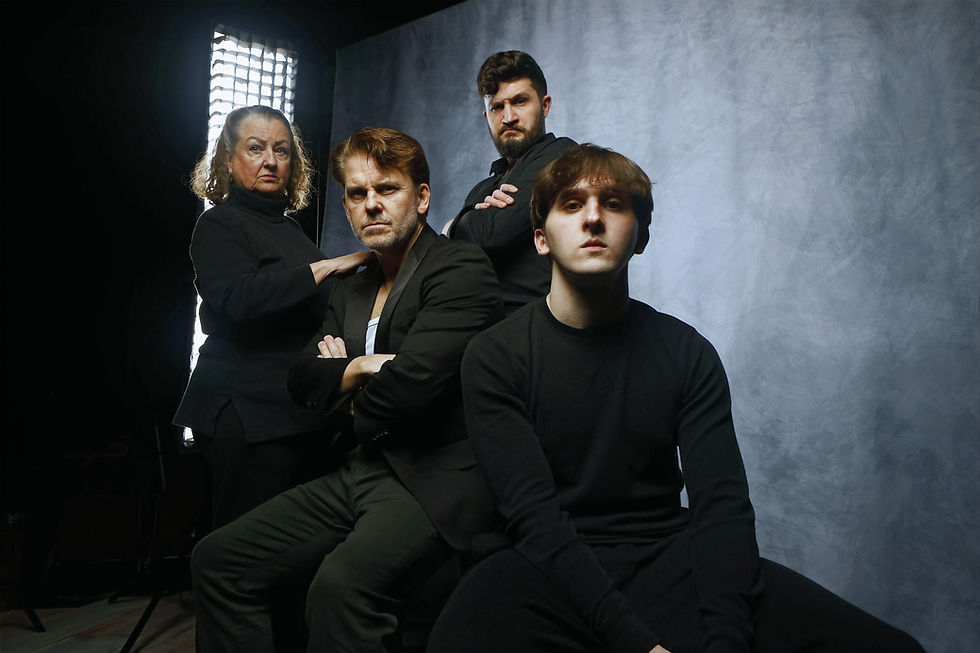REUNIONS at City Center Stage II: A Graceful Meditation on Love and Independence
- Anthony Chase

- Nov 10, 2025
- 4 min read
By Anthony Chase

Reunions, the intimate two-act musical now receiving an elegant debut production at New York City Center Stage II, takes an unusual structural gamble that pays unexpected dividends. Like Romance/Romance before it, this chamber piece pairs two distinct period stories to illuminate complementary themes. But where that earlier musical employed the same actors in parallel romances decades apart, Reunions offers something more complex: two views of love at vastly different stages, united by their 1910 setting and their clear-eyed assessment of romantic illusion.
The first act, drawn from J.M. Barrie's 1911 one-act "The Twelve Pound Look," unfolds in a London drawing room where Sir Harry Sims (Bryan Fenkart) prepares for his imminent knighthood. When a typist arrives to help with his congratulatory correspondence, the self-satisfied businessman receives an unwelcome shock: she is Kate (Chilina Kennedy), the wife who left him years before. What follows is less romance than feminist reckoning, as Kate reveals she departed not for another man but for independence itself -- after she saved twelve pounds to purchase a typewriter and, with it, her freedom.

The scenes between Kennedy and Fenkart crackle with the tension of unfinished business, while Courtney Reed's lovely and earnest Lady Emmy Sims, the current wife, remains oblivious to the charged history playing out before her, adding a layer of dramatic irony to Barrie's already pointed social commentary. A sequence in which the Sims entertain a gathering of odious and materialistic London socialites while waiting for the arrival of a woman author of actual accomplishment is particularly pointed and delightful.

Act Two shifts to a sun-dappled Madrid park, adapting "Mañana de sol" (1905) by the prolific Spanish playwrights Serafín and Joaquín Álvarez Quintero – aka The Quintero Brothers. Here, elderly strangers Doña Laura (Joanna Glushak) and Don Gonzalo (Chip Zien) meet by chance, their witty sparring gradually revealing them to be long-lost lovers separated by circumstance five decades earlier. In a delicious twist, both recognize the other but maintain an elaborate charade, spinning tales about "friends" rather than admitting their own romantic tragedy.
Glushak brings the confident bearing of an elderly woman who was once ravishingly beautiful and hasn't forgotten it, while Zien -- best known for originating the Baker in Into the Woods -- deploys his signature wit and natural charm to marvelously endearing effect. Their interplay, as they alternately match and best each other, is utterly adorable. After they initially clash over the possession of a public park bench, Gonzalo’s conciliatory offer of a pinch of snuff and the subsequent sneezing breaks the ice in a charming comic sequence that borders on slapstick.
The pairing illuminates how differently these characters approach romantic disappointment. Act One's Sir Harry views wives as ornaments in his relentless pursuit of success, while Act Two's reunited lovers return not to pick up where they left off, but armed with the wisdom that comes from a lifetime of experience. One story dissects how romance fails when reduced to possession; the other celebrates how it endures when grounded in mutual respect and playful engagement.
Jeffrey Scharf's book and lyrics navigate these tonal shifts with assurance, while Jimmy Calire's score proves a genuine surprise. Buffalonians may recognize Calire as a member and principal writer for Raven, the legendary Buffalo-based band of the 1960s. That his score here should be so period-appropriate -- Edwardian elegance in Act One, Spanish-inflected charm in Act Two --seems unlikely on paper, yet it works beautifully. The music is pleasingly nostalgic without feeling derivative, supporting rather than overwhelming the intimate storytelling.
Gabriel Barre's direction and choreography keep this tiny chamber musical moving with grace, never overreaching the material's modest scale. The production values are exquisite: Edward Pierce's scenic design, Jen Caprio's sumptuous costumes, and the atmospheric lighting by Ken Billington and Mitchell Fenton create a luxurious yet simple visual environment, while J. Jared Janas's hair and wig design adds period authenticity. This is an elegant and gracious evening in every respect.
One of the great pleasures of going to the theater in New York City is the opportunity to see the finest actors of our time. The powerhouse cast elevates material that, in lesser hands, might feel slight. Kennedy, who holds the distinction of having been Broadway's longest-running Carole King in Beautiful: The Carole King Musical, brings steel and self-possession to Kate. Reed, who originated Jasmine in Disney's Aladdin, invests Lady Emmy with more dimension than the role might suggest. Daniel Torres capably handles multiple supporting roles, while Fenkart anchors Act One with the necessary pomposity and eventual deflation.
But the production soars in Act Two, when Glushak and Zien take center stage. Both are theater treasures -- Glushak a ubiquitous Broadway presence including 1776, A Gentleman’s Guide to Love and Murder, Hairspray, Warpaint, Sunday in the Park with George, and Les Misérables. She has also appeared in Buffalo, at Shea's in Young Frankenstein and Fiddler on the Roof, and years earlier at Studio Arena Theatre in a Galileo musical with a score by Jeanine Levenson (later Tesori, composer of "Kimberly Akimbo" and "Caroline, or Change"). Zien, beyond his Sondheim pedigree, originated Dr. Mendel in William Finn's Falsettos trilogy. Together, they create romantic magic from the simplest materials: a park bench, afternoon sunshine, and the accumulation of seventy years.
Reunions reminds us that small-scale musical theater, executed with artistry and intelligence, can offer pleasures unavailable to large-scale spectacle. This is a show about people talking, remembering, reassessing -- and in that intimate focus, it finds both poignancy and wisdom about how we navigate love's disappointments and unexpected second chances.



